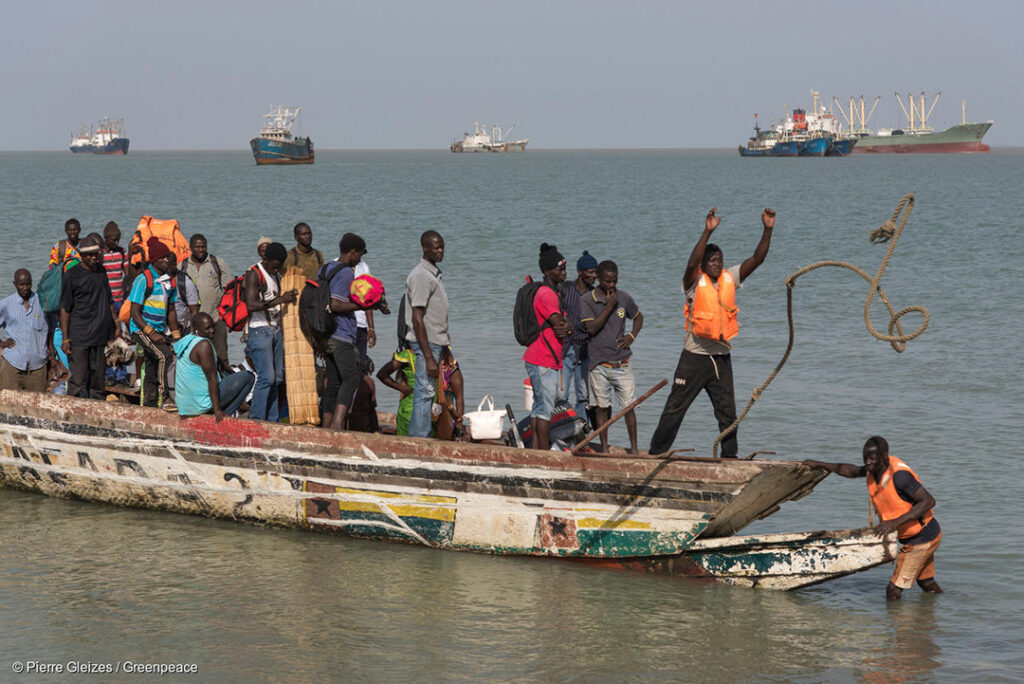ADF STAFF
Ghana’s Ministry of Fisheries and Aquaculture Development announced plans in mid-September to review licensing loopholes that allow foreign fishing companies to operate illegally, often by establishing shell companies that disguise a vessel’s true owner.
Shell companies typically operate through local front companies, using opaque corporate structures to import their vessels, register and obtain a fishing license, according to the Environmental Justice Foundation (EJF).
While foreign industrial fishing vessels are banned in Ghana, some companies are known to pay off local entities for illegal fishing purposes, Fisheries Minister Mavis Hawa Koomson said in a story by the Ghanaian newspaper Daily Graphic.
Ghanaian law also prohibits foreign owners or controllers of industrial trawlers from flying the country’s flag, but that is also done routinely — a practice known as flying a flag of convenience. It helps vessel owners dodge financial charges and other regulations.
“We are aware of their activities, and that is why we are working on the requirements for licensing and the reason industrial vessels have not been allowed to go to sea yet,” Koomson said.
When it comes to eliminating illegal, unreported and unregulated (IUU) fishing, a growing number of experts say that determining the true owners and beneficiaries of fishing vessels may be more efficient than targeting at-sea activity. An estimated 90% of trawlers operating in Ghana are owned by Chinese corporations, according to the EJF.
“If you look at the highest risk actors out, very few of them are flagged, the vessels, very few of them are flagged with the company established where the owner is,” Duncan Copeland, executive director of Trygg Mat Tracking, told Mongabay, a nonprofit environmental science and conservation news platform. “Most of them now are starting to use various companies that are actually shell companies, joint ventures.”
A joint venture agreement is an arrangement between two or more companies to start a new company for their mutual benefit.
There are no legitimate benefits to African nations to let fishing vessels owned by shell companies operate, Copeland told ADF earlier this year.
Illegal fishing vessels are also known to change their vessels’ names, fail to register at ports and underreport their catch, all of which deprives locals of food and income while destroying ecosystems and decimating fish populations.
From a law enforcement perspective, it’s harder for authorities to catch illegal fishing trawlers that are almost constantly on the move than to deal with owners of land-based businesses. Still, according to the Mongabay report, most of the regulatory approaches to illegal fishing prioritize at-sea activities.
“So, whereas the extractive industry sector has become aware of the need to identify beneficial owners decades ago, it is only recently that similar thinking has reached the fisheries sector,” Steve Trent, executive director of the EJF, told Mongabay.
Costly Practices
Illegal marine trade costs West Africa almost $1.95 billion across the fish value chain and $593 million per year in household income. IUU fishing has also been linked to other crimes such as piracy, kidnapping and drug trafficking.
China is the world’s worst IUU fishing offender, according to the IUU Fishing Index, and has targeted West Africa for decades.
Ghana’s marine fisheries support the livelihoods of more than 2.7 million people — almost 10% of the population. More than 100,000 fishermen and 11,000 canoes operate in the country, but due to overfishing and IUU tactics, average annual income has dropped up to 40% per artisanal canoe in the past 15 years or so, according to the EJF.
Ghana’s commitment to tightening licensing loopholes comes as the country works to resolve problems related to a yellow card it was issued by the European Union this year. A yellow card is a warning that sanctions may be imposed if a country does not improve efforts to halt IUU fishing.
If those problems aren’t resolved, Ghana could be issued a red card, meaning its fisheries products will be banned from the EU market, where most of Ghana’s fish are exported.
Hawa Koomson said Ghana’s government “is also taking steps to acquire four patrol boats that will be deployed in the four coastal regions to support frequent inspection at sea, as well as a research vessel for regular conduction of scientific fisheries research,” according to a SeafoodSource report.

